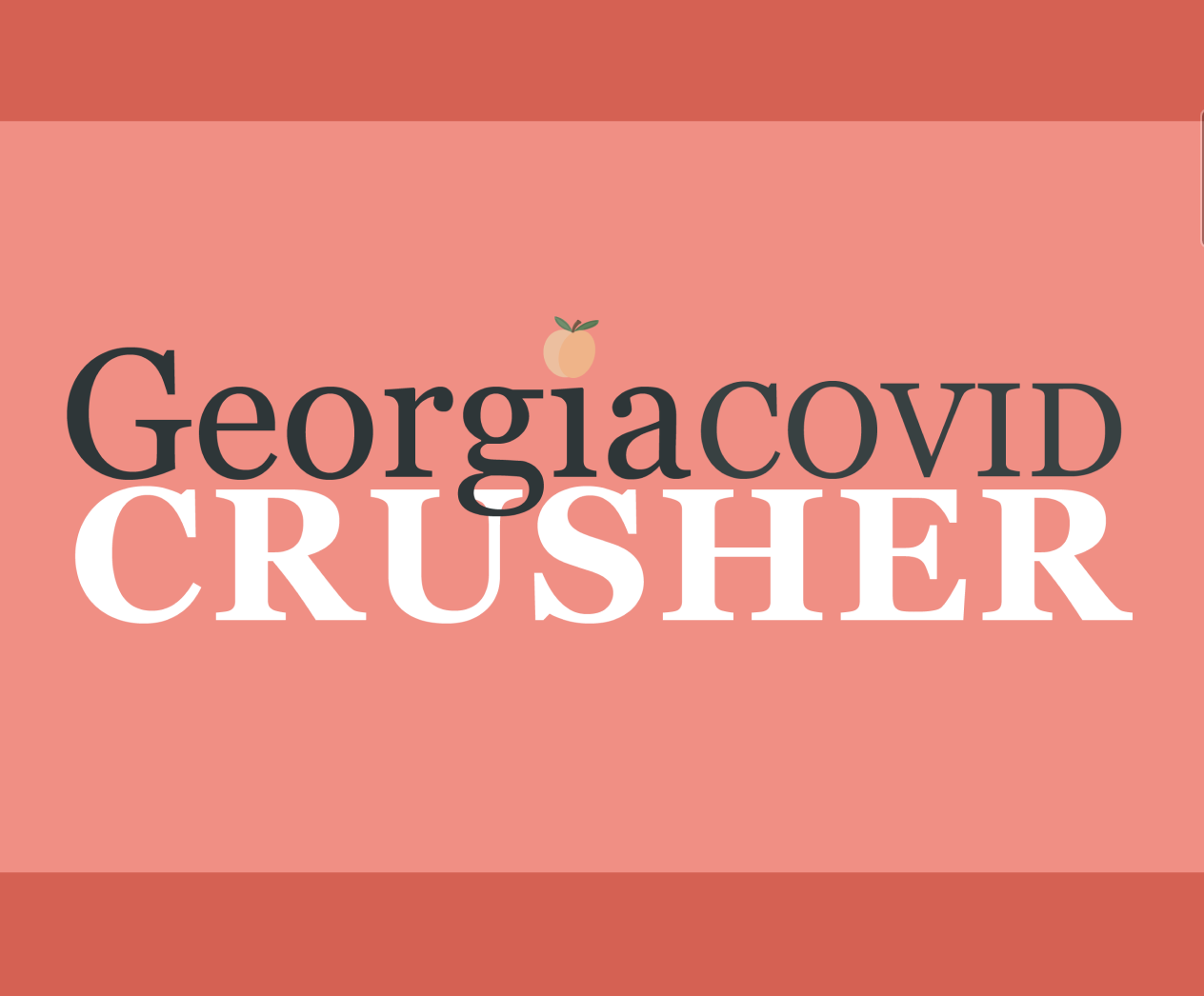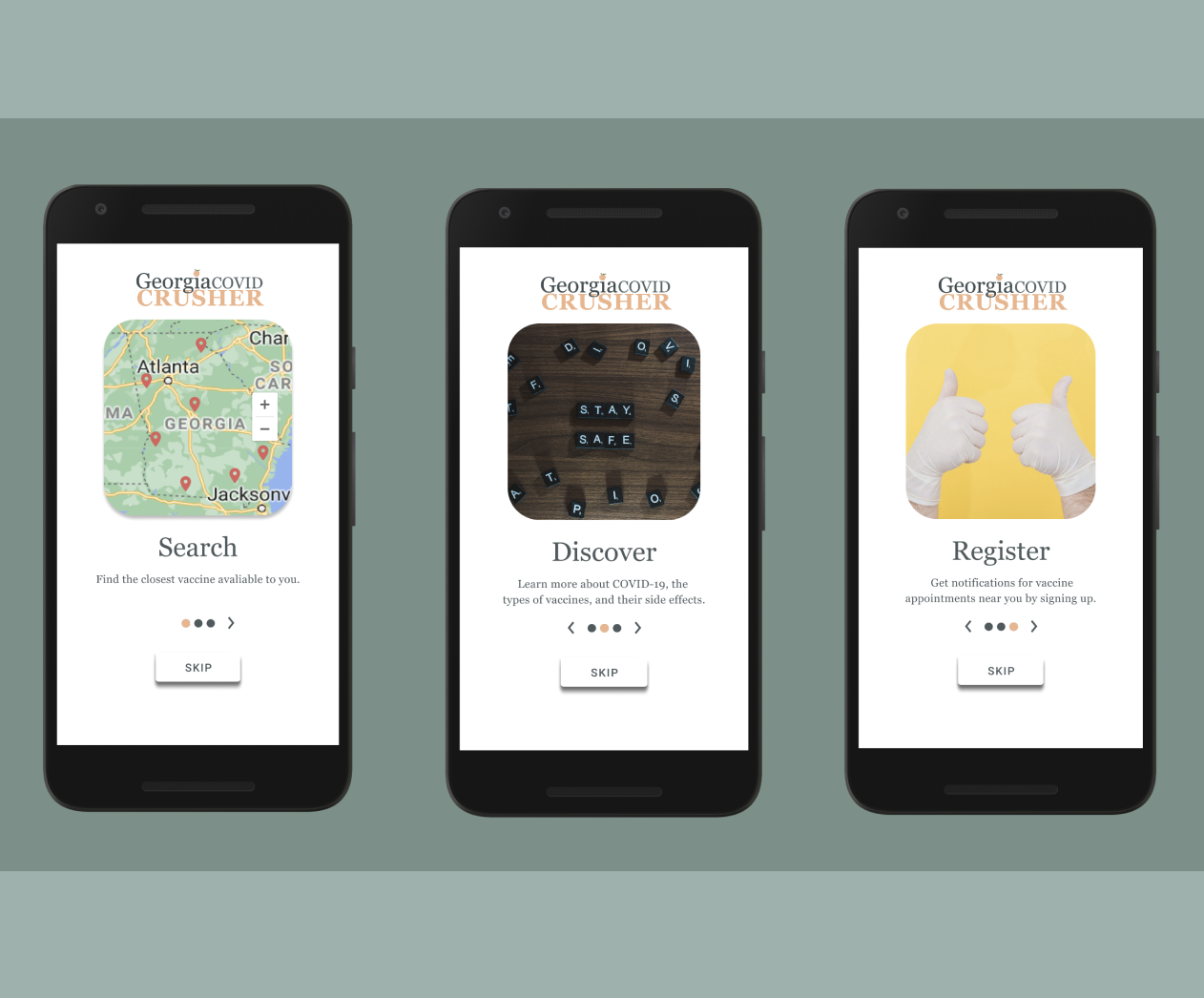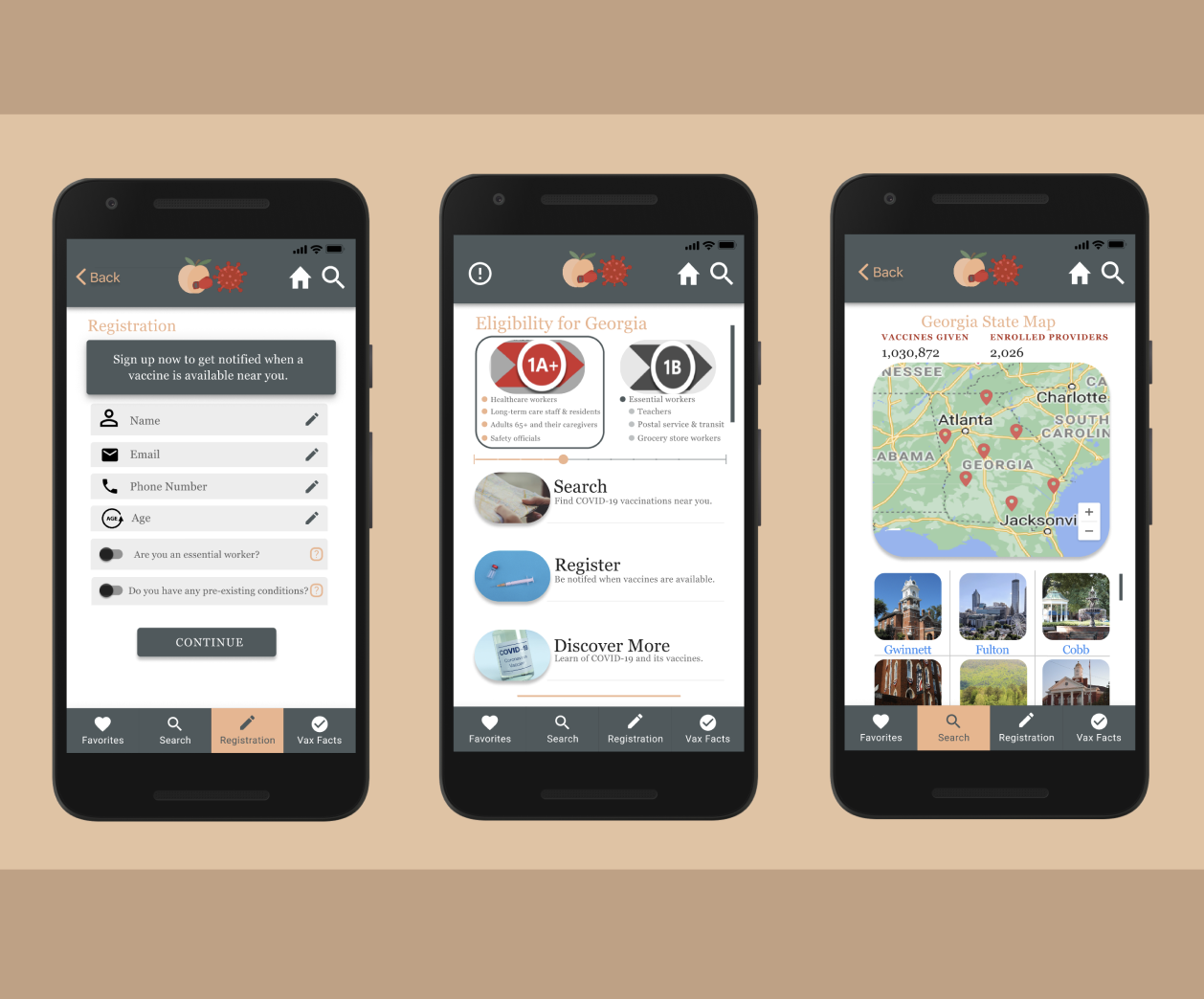Georgia COVID Crusher
Mobile Notification App







Timeline: January - February 2021
Team:
Leanna Abraham - UX/UI Designer
Nick Duncan - UX/UI Designer
Sydney Hembree - UX/UI Designer
Project Type: Mobile Web Design
My Role: User Research, User Flow, Project Management, Wireframing, & Prototyping
Tools: Figma, InVision, Trello, Slack, Adobe Creative Suite, Google Drive, Miro
As the COVID-19 virus overtook the world, many people found themselves worried for their lives and the lives of their loved ones. The race for a vaccine began immediately and the most susceptible of the population anxiously waited to get their hands on one. At the time that this project was in the works, vaccines were scarce, as supply had yet to meet demand.
Because the State of Georgia had not released an application to the public to direct them to distributors of the vaccine, we decided to make a prototype to fill in that gap. Our app seeks to ease the search process of finding vaccine distributors while also providing notifications on the upcoming registration windows for those who wish to be vaccinated.
User Research, Competitive Analysis, User Pain Points
Research Data Analysis, User Persona
User Flow, Journey Map
Sketches, Lo-Fidelity Wireframes
User Testing, Iterations
We started researching user pain points through an online survey, user interviews, social media, and the news. Users were targeted based on current and future eligibility for COVID-19 vaccines; this was done to potentially increase ‘herd immunity’ for Georgians at a faster rate, as these individuals would benefit the most from the vaccines.
Out of all the pain points gathered, users wanted an app that would state who was eligible for the vaccine, where to find vaccine distributors, which vaccines were available nearby, and when they could register at nearby venues. This was extremely important at the time because, according to the information we received, over 90% of users hadn’t been inoculated against the virus by means of a vaccine yet.
“It was very difficult to get vaccine information. Every time I registered with Kroger or Publix, there were no timeslots free. The health department finally called me 20 days later and got me on the schedule.”
"I was vaccinated because of my job. However, I think it's hard for people not necessarily familiar with getting different health information. I think it can be really confusing with lots of mixed messages coming out about vaccine supplies."
"The vaccine is difficult to track because you don't know who has it. It comes in, it's used, and it runs out. By the time we find out that they're scheduling appointments, there aren't any appointments left."
"We don't get a choice [to take the vaccine]; work is procuring the vaccines for us. I think it's the Moderna one, but I couldn't tell you. They're getting one for everyone quickly [because we work in the energy sector]."
As we were starting an app from scratch, the three of us separately researched applications and websites that provided vaccine information. On a macro level, the Center for Disease Control and Prevention (CDC) was at the top of our list because over 60% of our users ranked it the most trustworthy for reliable information. On a micro level, we chose to look at companies that affected Georgians specifically (the Georgia Department of Public Health, WellStar, Walgreens, and Publix).
Common features included highlighting vaccine eligibility, showcasing locations for distribution, informing the public on vaccine availability, and emailing users information. While we chose not to include features found on Virginia's COVIDwise app or Rhode Island's Crush COVID app, we pulled insights from online reviews, which helped us design the sitemap of our site.







As a whole, users fell into two camps: those whose doctor or employer registered them for the vaccine and those who had to register themselves. Self-registered users struggled to find vaccine suppliers because distributors (Walgreens, Publix, WellStar, etc.) were limiting registration to keep second vaccine doses available for those who had received their first shot already. Therefore, the main user pain point centered around supply and demand.
After much deliberation, we each came to the conclusion that it was unrealistic of us to tackle registering Georgians on behalf of distributors; vaccines were being used so quickly that we would still have a supply and demand problem, similar to overselling seats on an airline. We thought it best to be a supplier of information instead, allowing users to track registration windows for themselves or loved ones.

Marie Johnson, a middle-aged mother of two, wants to keep her family safe while, simultaneously, get back to her life pre-pandemic. Her first grandchild was born during COVID and she has yet to meet them for fear of contracting the illness or, worse, passing germs to the newborn. Ultimately, she wants a vaccine without the headache of signing up for one.
Users discussed preferences for app features during user research, including a notification process
for places providing the vaccine nearby, information about vaccines available, and searching for
locations through zipcode, GPS, and county. Users like Marie should, in our view, be able to find
and
save locations that they want updates on.
Similar to job boards, this app is designed to allow users
to choose and remove notifications on vaccine availability as they see fit. They can also learn more
about the Pfeizer, Johnson & Johnson, and Moderna vaccines through videos, statements from the CDC,
and so on.



Marie isn't as skilled as she would like to be regarding technology. However, she wants to avoid
being on hold with the local vaccine distributor for over six hours too. Therefore, she is resolved
to look outside of the box. She stumbles across the Georgia COVID Crusher app through the Google
Play store and downloads it; there, she chooses to manually look up her county and finds six
distributors nearby.
Marie saves three and signs up for frequent email notifications. When one of her saved
locations opens COVID-19 vaccine appointments, she receives an email prompting her to sign up, which
she does. Within a week, she has her first vaccine and goes on to register for her second with the
location itself.




When sketching out design ideas, we each brought unique perspectives that improved the user's experience. Collectively, we agreed from the start to make the app for Android phones, which is why there are top and bottom navigations. The process started with copy and statistics; we built cards, scrollable sections, and a search feature from sketches shown below.






Ideas from our individual sketches emerged and, as a team, we decided to have the logo front and center, with a back button and search icon for easy access. We focused on the practical aspects of this app from start to finish. Users wanted a way to quickly find places nearby to receive COVID vaccines; ergo, we gave them a second navigation bar to find notification information quickly.



We conducted two rounds of user testing; four users tested our paper prototype and two tested our mid-fidelity app. Feedback from these tests focused mostly on aesthetics. For example, the peach color was considered too light, our font of choice ('Georgia') was hard to read in places, and drop shadows made some unclickable icons appear clickable to users. However, we made quick work of these user insights and updated the site to reflect these changes.
“I think it would seem more legit if there was a verification portion listed under the normal information on the page. It would add credibility.”
“Your landing page appears too busy with too much to read right now. [...] Pick either stars or hearts for the favorites because you can’t have both.”
"Use a brighter color for the peach to make it pop out more. Also, maybe add a more modern font like 'Roboto' or one without serifs."
Through our user tests, we updated the homepage, removed most of the drop shadows, and fixed the font to be 'Open Sans'. Our color choice, peach, intentially picked for the Peach State, was altered slightly to be seen more. From a user's perspective, however, the site functioned well. We received few comments on where something was or how best to access portions of the site.




To conclude, our team launched this project because there was a need from the public to get COVID-19 vaccination information out quickly. Through our discussions with family and friends, we gathered user pain points that led us to creating a mobile notification app. As this three-week sprint concluded and our group went on to do other projects, the Georgia Department of Public Health launched its own app for finding and notifying Georgians of COVID vaccines nearby. All's well that ends well.

Located in a retired elementary school, the Little Five Points Community Center house local nonprofits. However, their website isn't being maintained, resulting in confused users.

A 2020 Florida startup, Streams of Sound is taking handpan music to healthcare facilities to promote healing. However, the nonprofit needs a helping hand to get its branding on par to its mission.